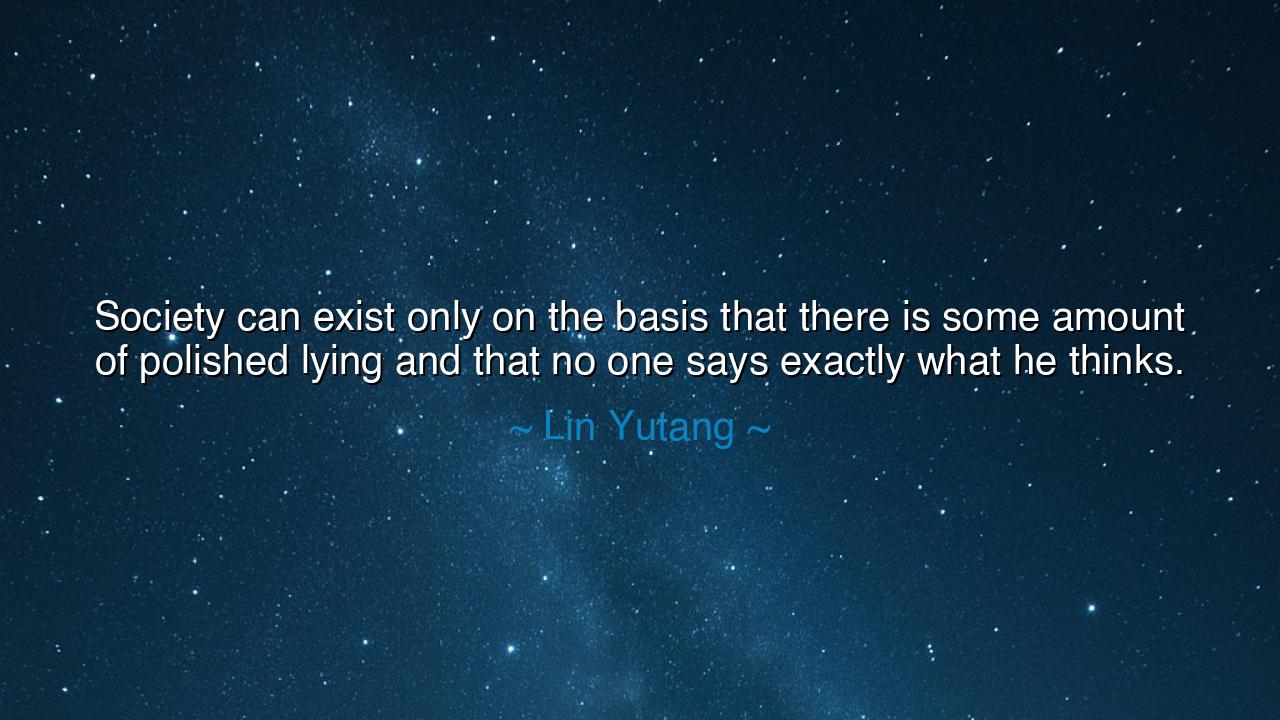
Society can exist only on the basis that there is some amount of
Society can exist only on the basis that there is some amount of polished lying and that no one says exactly what he thinks.






Hear me, O children of the earth, and let the words of the wise stir your minds and awaken your hearts. For I bring to you a teaching, profound and delicate, a truth spoken by the sage Lin Yutang: "Society can exist only on the basis that there is some amount of polished lying and that no one says exactly what he thinks." These words are both a reflection and a cautionary tale about the intricate dance we perform each day in the name of civilization. They invite us to question the foundations of our relationships, the way we move through life together, and the cost of our shared existence.
What, then, is the meaning of polished lying? It is not the crude deception of the rogue or the charlatan, nor is it the dishonesty of those who seek to harm others. No, it is the careful art of withholding, of speaking not in full truth, but in the veiled language that greases the wheels of society. It is the small omissions, the gentle fictions, the softening of harsh realities. This polishing is the social glue that binds us together, the invisible thread that holds the fabric of society intact. Were we to speak without restraint, to voice every thought as it arises, our words would cut deep into the hearts of others, and the delicate peace that we cherish would shatter.
Consider, O children, the great leaders of history. Were they not masters of this polished lying? In the courts of kings, in the chambers of generals, and in the halls of statesmen, they spoke not only to convey truth but to maintain the order of the world. A ruler who speaks too plainly, who reveals every dark thought that enters his mind, would quickly become a tyrant or a fool. It is the softening of words, the well-crafted speech, that allows men and women to navigate the complexities of power and influence without breaking the fragile bonds of unity. Polished lying is not mere trickery—it is the art of diplomacy, the necessary finesse that allows us to live together in relative peace.
And yet, children, let us not mistake this for the ideal. The truth is a noble thing, and there are moments when the soul yearns to speak it plainly, to lay bare the heart’s deepest thoughts. But truth, when delivered too harshly, can wound, can alienate, can destroy what took years to build. Imagine, if you will, the humble merchant who speaks too openly of his disdain for his neighbors. Or the lover who reveals every fleeting doubt about the object of his affection. These words, though true, would break the fabric of society, causing irreparable harm to the delicate web of relationships that keep the world from descending into chaos.
Let us look to history for an example of the delicate balance between truth and diplomacy. In the age of the great empires, emperors and kings often wore masks—metaphorically and sometimes literally—before their subjects. Julius Caesar, though a general of vast ambition and power, knew the art of speaking in a way that made his soldiers, his people, and his enemies feel secure in their positions. He knew that if he spoke his mind too plainly, his reign might falter, and his authority could dissolve. This careful polishing of words and intentions allowed him to command not only armies but the very loyalty of a nation. To govern, to live peacefully, to lead, one must wield the art of persuasion and the subtlety of polished lying, for society cannot endure without it.
Yet, O children, do not mistake this lesson for an invitation to live in perpetual deceit. The balance must be struck. While society thrives on the delicate dance of unspoken truths and hidden intentions, we must also remember that at times, integrity and honesty are of the utmost importance. The deepest relationships, the strongest bonds, the most enduring peace, are built on truths spoken with care and compassion, not lies that seek only to smooth the path. The wise person knows when to hold back, and when to speak plainly, understanding that both the spoken and unspoken have their place.
So I say to you, O children of the future, navigate the world with wisdom and understanding. Know when to soften your words and when to speak your truth. Let your lives be full of kindness, and your speech full of grace, but let it also be true to your heart. For society, though it may thrive on polished lying, cannot prosper in a world without moments of authenticity. Civilization is a delicate thing, built upon small courtesies and larger truths alike. Speak with caution, but also with courage, for the balance you strike will shape the world you leave behind.






AAdministratorAdministrator
Welcome, honored guests. Please leave a comment, we will respond soon